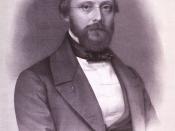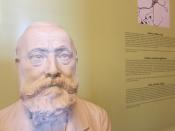Rudolf Ludwig Carl Virchow was one of the greatest minds of the 19th century. His willpower and determination of studying made great advancements in pathological and physiological medicine. He created the modern concept of pathological processes by his use of the cell theory to explain the effects of disease in the organs of the body. Virchow was born in Schivelbein, Prussia (now part of Poland) on October 13, 1821 and was the only child of a farmer and a city treasurer. He was taught from Johannes Muller (also known as the father of the German scientific method in medicine), a German physiologist who studied the nerves system (as well as composition of organic matter). Muller wrote a book titled Elements of General Physiology that encouraged Virchow to his works. In 1830 he attended Friedrich Wilhelms Institute to study medicine and planned to become an army doctor.
Virchow achieved a scholarship to Friedrich Wilhelms Institute where there he studied medicine.
He then went on studying (government, ophthalmology, scabies, internal disease, and psychiatric) in Berlin at Charite after Friedrich Wilhelms and eventually obtaining his license to become a medical doctor. He later was employed as a junior surgeon at Charite Hospital and studied under Johannes Muller, a renowned physician who supported scientific severity. He also worked with Robert Froriep who demonstrated to Virchow the advantages of the microscope.
At this time he still had a friendship with Benno Reinhardt who worked for Carl Meyer. Virchow started to listen and accepted the idea of liberalism that was talked about over MeyerÃÂs family. Virchow soon lost his internship in Charite due to his ÃÂnarrow-mindedÃÂ view of the German government. In 1847 he became a lecturer who wasnÃÂt paid. When Virchow returned to the hospital he was selected to be the founder of cellular pathology...


